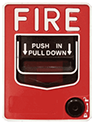Video MGMT System
 Access Control
Access Control
Voice & Data Wiring
 Burglar Alarm
Burglar Alarm
 Fire Alarm
Fire Alarm
Video MGMT System
Voice & Data Wiring
THOUGHT CENTER > Blog > Security Cameras
January 26, 2024
Mammoth Brief
Too busy to read? Here’s a summary:
When it comes to safeguarding your business or organization, security cameras play a pivotal role. They're the vigilant eyes that provide real-time monitoring, deter potential threats, and provide crucial evidence when incidents occur.
It’s no wonder, then, that the value of the global physical security system market was $50 billion as recently as 2020 and is expected to top $83 billion by the end of 2024.
Understanding the lifespan of security cameras is essential for informed decision-making about camera selection, maintenance, and budgeting.
That’s why, in today’s article, we're exploring the factors that influence camera longevity and how to keep cameras at peak functionality for as long as possible.
Whether you already have CCTV cameras and want them to last longer or are thinking of adding new cameras to your system, keep on reading for information you can use.
Commercial-grade security cameras are robust and enduring. On average, they last from five to ten years, and their lifespan varies based on the following key factors.
The quality of a security camera plays a pivotal role in determining its longevity. High-quality cameras from trusted manufacturers like Avigilon tend to outlast their cheaper counterparts.
In other words, while investing in top-notch cameras is costlier at first, it pays off in the long run.
Outdoor security cameras face the elements day in and day out, and environmental factors significantly impact their lifespan. Exposure to extreme temperatures, moisture, and other weather conditions accelerates wear and tear.
For outdoor durability, use weatherproof cameras with an IP (Ingress Protection) rating of IP65 or higher.
Just like any piece of machinery, regular maintenance extends the life of security cameras. Simple tasks like cleaning lenses, checking for loose connections, and updating firmware go a long way in preserving their functionality.
The type of camera can significantly impact its durability and lifespan.
For example, PTZ cameras, with their moving parts, require more maintenance than other camera types and have a shorter lifespan due to wear and tear.
Most fixed-lens cameras, on the other hand, have a simpler design that gives them relatively longer lifespans when they’re properly maintained.
Now that we've touched on the factors affecting security camera longevity let's explore some actionable steps you can take to keep your cameras reliable for years to come.
Periodically inspect your security cameras for any signs of damage or wear. Also, dust and debris accumulate over time, reducing image quality. So be sure to clean lenses and casings periodically.
Manufacturers often release firmware updates to improve camera performance and security. Stay on top of these updates to maximize your camera's capabilities and protect against vulnerabilities.
Proper installation by certified technicians ensures your security cameras are positioned correctly and securely.
Professional installation not only extends camera lifespans, it optimizes their effectiveness and maintains warranty agreements.
When purchasing security cameras, consider the warranty and after-sales support offered by the manufacturer or dealer. A strong warranty can guarantee assistance if issues arise.
Working with a local dealer and installer, such as Mammoth Security in Connecticut, means you’ll have a nearby team that knows your system and is ready to help.
Technology evolves rapidly, and security camera systems are no exception. Periodically assess your system and consider upgrading to newer models with enhanced features and better durability.
Selecting security cameras designed for your specific needs and environment. There are many options to choose from in the security system marketplace, so consult with security experts who can recommend the best equipment for your unique scenario.
Your security is an investment, and the longevity of your cameras plays a pivotal role in your success. Our team at Mammoth Security possesses the expertise and workmanship necessary for a wide range of security needs, and we’re committed to treating your security as if it were our own.
Don't miss the opportunity to enhance your security measures with a free site visit from an expert on our team. Reach out to us by clicking on the contact and filling out the form. We're offering free site surveys and security assessments to businesses that contact us through the form.
Let us help you make informed decisions about your security investments and maintenance. With our team, you can be certain that your security is in capable hands.
NOT COMPLETELY SURE?
860-748-4292Surveillance cameras typically last between five to ten years, depending on factors like build quality, environmental exposure, and maintenance. High-quality cameras and regular maintenance can significantly extend their lifespan, making them a long-term investment for security needs.
The quality of a security camera plays a crucial role in its longevity. High-quality cameras from reputable manufacturers usually outlast cheaper models, making them a worthwhile investment in the long run.
Regular maintenance is key to extending the life of security cameras. Tasks like cleaning lenses, checking connections, and updating firmware help in preserving their functionality and performance.
Outdoor security cameras are subject to environmental factors like extreme temperatures, hail, snow, and smoke, all of which accelerate wear and tear. Using weatherproof cameras with high IP (Ingress Protection) ratings is therefore advisable for outdoor applications.
To prolong the lifespan of security cameras, regularly inspect and clean them, keep firmware updated, and use local professional installers. Additionally, periodic system upgrades can enhance longevity and functionality.
Professional installation by certified technicians is important for security cameras as it ensures they are positioned correctly and securely, optimizing their effectiveness, extending their lifespan, and maintaining warranty agreements.
Firmware updates, released by manufacturers, improve the performance and security of cameras as new cyber threats develop. Staying on top of these updates maximizes camera capabilities and protects against vulnerabilities.
CCTV cameras generally have a lifespan of five to ten years. This duration can be extended with proper care and maintenance. Factors like the camera's quality, exposure to environmental conditions, and the frequency of maintenance play a crucial role in determining their longevity.